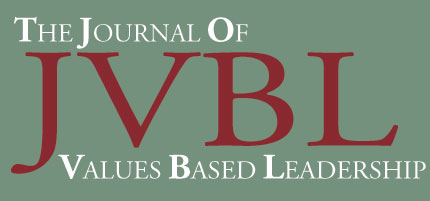- CONTENTS:
- Table of ContentsLetter from the EditorThe Making of a “Philanthropreneur”Dynamic Leadership: Toolbox for the Values-Based EntrepreneurCapitalism Revisited: The Interplay of Motivation, Inspiration and RiskWorkplace Bullying and Ethical LeadershipPrinciples for Accountable Leadership – The AA1000 Series
- LETTER FROM THE EDITOR
Greetings and Happy Holidays!
As news of the existence of our Journal disseminates, initial feedback has been overwhelmingly encouraging and supportive from readers spanning political, business, and academic backgrounds and to other members of the interested public. So many of our global citizens recognize the urgency to infuse values — whether stemming from fiscal accountability, environmental stewardship and social responsibility concerns — into leadership roles and operating challenges. The query, once confined exclusively to the reasons why attention has been directed to the need for values-based leadership in today’s world, is no longer the solitary focus; this Journal provides a vehicle of necessary expression which seeks to identify and explore potential remedial actions. Then again, as with any matter posing an ethical challenge, more questions are seemingly generated then replies provided.
In our inaugural issue, Michael McCuddy, The Louis S. and Mary L.. Morgal Chair of Christian Business Ethics at Valparaiso University’s School of Business, provided a general paradigm of moral leadership, depicting three classifications of fundamental moral orientations. Leaders are described as “self-less”— possessing the characteristics of complete and utter sacrificial stewardship to the community; “self-ish”— or self-aggrandizing stewardship; and lastly, “self-full” — described as the most promising approach for creating sustainable business organizations and human communities. It is this type of business leader who embodies the concept of “values-based leadership,” helping communities to survive and prosper over the long term while concomitantly attaining personal and professional fulfillment. This theme is perpetuated through the contributions of the authors in this issue. Trevor Field, a self-proclaimed “philanthropreneur,” fits squarely into the model of a self-full leader. Field, the founder of Playpumps International and the CEO of Roundabout Ltd. is driven by a determination to give back to his community which — by his definition — is the world, without completely sacrificing the comfort enjoyed by himself and his family. His philosophy of attaining personal business success while offering the global community a tangible, sustainable good, is presented via an interview conducted at his home in Johannesburg, South Africa in March, 2008.
Closely related to the story of the mission and operation of Playpumps International and Roundabout Ltd is an article — also based upon an interview — with Duncan Goose, director and founder of “One” Water as well as CEO of Global Ethics Ltd., both situate in London, UK. While Goose also gained his business acumen and well-respected reputation in the advertising industry, he took the initiative to single-handedly create a global, bottled water industry that has permeated both the European and Australian markets and is currently making its mark in Asia and North America. Goose’s business successes, coupled with his keen awareness of the disparity of wealth and resources throughout the world, has prompted him to commit 100% of his company’s net profits to Playpumps International, characterized by the company’s trademark: “You Drink; They Drink.”
Well-known business ethicists Charles Manz and several of his business doctoral students hailing from the University of Massachusetts at Amherst, have constructed four leadership models for the business entrepreneur. Careful attention is given to the preservation of the business leader’s original vision and workplace values for the newly-developed company. David Yamada, Professor of Law and Director of the New Workplace Institute at Suffolk University Law School in Boston, Massachusetts, is a leading authority on workplace bullying. His contribution examines psychologically-abusive work environments and the toll exacted on both the worker and the employer when harassment remains unchecked and common considerations are forfeited.
Lastly, as businesses struggle to achieve greater sustainability and transparency in their operations and reporting activities, the need to have comprehensive, globally-applicable, reporting guidelines has become critical. AccountAbility, headquartered in London, provides this protocol by assisting businesses to help identify entities affected by a particular business’s operations and to become more accountable to its growing spectrum of stakeholders.
— Elizabeth Reiner Gingerich , J.D., Editor

